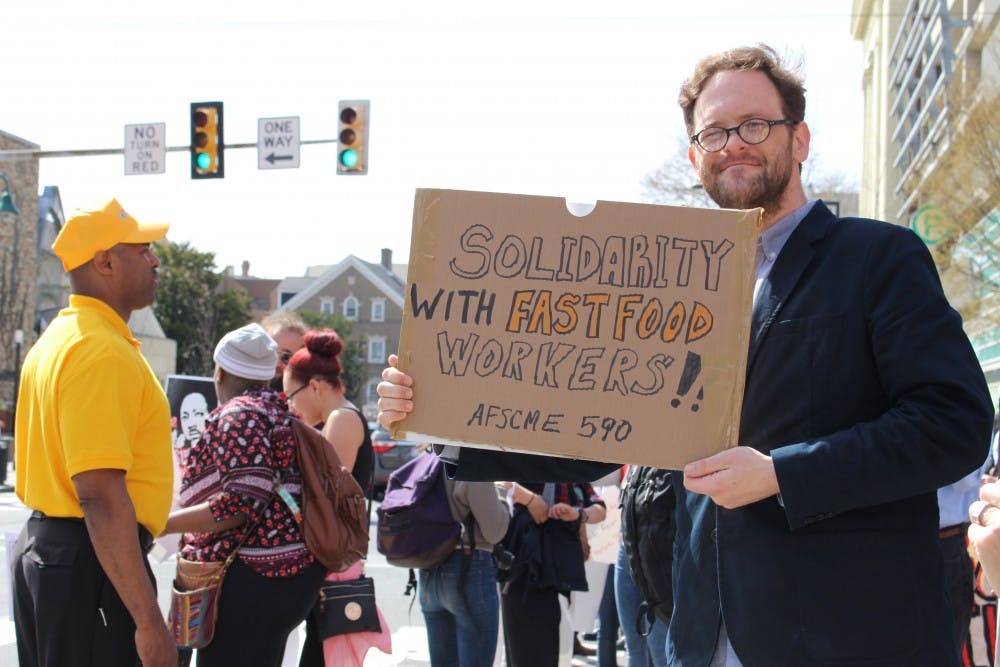“Happy meals are not very happy without getting $15 of pay,” a sign read outside the 40th and Walnut streets McDonald’s Wednesday afternoon. Underpaid workers across the country assembled to form small scale action in hopes of creating a large scale change.
On April 15, better known as “Tax Day,” a walkout was held for the “Fight for $15” campaign. An estimated 3,000 students from Drexel, Penn, Temple and other colleges stood in front of McDonald’s and marched down to the Market Street Bridge. City Council at-large candidate and Penn alumna Helen Gym announced her support of the event in a press release. The protest was part of a larger action: 60,000 underpaid fast food workers from around over 200 schools in the country mobilized to rally and march.
The Fight for $15 movement started in 2012, when a couple hundred food workers in New York City went on strike, demanding a $15 hourly pay and the rights to form a union. Since then, the movement has expanded beyond food workers, as home healthcare, childcare and airport workers have joined in as well.
In Philadelphia on April 15, workers went on strike at 6 a.m. at the Broad and Arch streets McDonald’s to sign up for the Fight for $15. Between 7 a.m. and 2 p.m., allied unions had “speakouts” outside of McDonald’s locations around the city. About an hour later, the protests near Penn’s campus erupted.
McDonald’s is one of the largest employers in the country, with millions of workers. These employees are scraping by on the current federal minimum wage of $7.50. A full-time worker who works 40 hours per week, 51 weeks out of the year — assuming that they have no vacation — after taxes, make $11-12,000 per year, just over poverty level of $10,000 a year for a family of three.
“I think it’s really important to acknowledge the inequality that is taking place every day in the U.S. and how it perpetuates throughout the world in addition to the effects that corporations have on working individuals’ everyday lives,” Drexel senior Sarah Bodhuin said at the protest. “[This movement] makes people acknowledge what’s going on. These corporations have a social responsibility, but they want to make money.”
The movement has resonated with students and professors on college campuses. With rising costs of tuition resulting in higher levels of student debt, Fight for $15 advocates and Drexel students Adam Bleiman and Chris Quirin feel that it is important for college students to recognize and identify with the injustices low wage workers are facing.
“Students should be supporting worker struggles for a better world,” Bleiman said. Noting that college students have always been involved in social movements, Bleiman believes it is important that students take the time to express their passions for causes such as Fight for $15. He added that college campuses are really solid meeting places for movements like Fight for $15, as college students are curious about life and their futures.
“People should support this because our economy has become increasingly based on service work,” College sophomore and protest participant Peter Thacher said. “Service work does not pay very well in the fast food industry. In order for the middle class to thrive, they need to be paid living wages.”
Bleiman also pointed out that he sees the Fight for $15 as a “revitalization of the labor movement,” as many jobs today are service sector jobs that are not unionized. Quirin, a former Jimmy John’s and Sears worker, feels that “we have to recognize that we rely on service people,” as the work these people do comes into play in many of our daily lives.
The fight for low-wage workers might even include adjunct professors. Department of Visual Studies adjunct professor Anna Neighbor supports the Fight for $15 because she feels that “presenting a united fight for low-wage workers” is important. As an active member of the United Academics of Philadelphia union, which promotes the interests of adjunct professors in the city of Philadelphia, Neighbor recognizes that the Fight for $15 struggle is directly related to the struggles faced by adjunct professors at universities.
“Each of us in our own isolated instances are part of a much larger struggle that goes beyond whether we are working at a university or at a McDonald’s corporation,” Neighbor said. “Adjuncts are incredible professors, they just have to work 200 percent more. They have to work 200 percent harder to be incredible teachers because they are not receiving the support they should be receiving.”
The majority of faculty are part-time, receive no benefits and are hired on a semester-to-semester basis, something Neighbor feels is indicative of a divestment in higher education overall.
“In perspective of us being students, a lot of people have debt and we need to get good jobs after graduating to be able to pay off that debt,” Thatcher said. “It’s the same thing at McDonald’s, where their workers need a living wage. We can identify with these workers to be able to make a living wage to fulfill their lives and be happy.”



